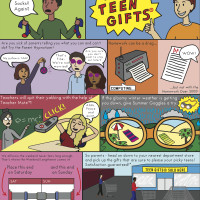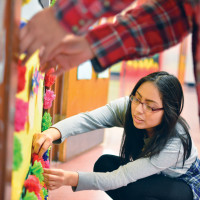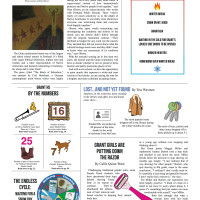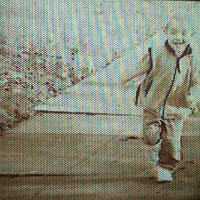Grant soccer player Dylan Palmer remembers the mix of emotions he felt the night before his team played in a playoff game against West Salem in early November.
The Generals were ranked third in the state and Palmer, a junior who is black, was called up to the varsity team for the playoffs. He’d spent the season on junior varsity after sustaining a serious injury the year before.
But Grant’s team was confident, finishing atop the Portland Interscholastic League with a 6-0-1 record.
Spirits were high as the team gathered for a team dinner at one of the player’s houses. Everything was focused on the camaraderie when things for Palmer turned upside down.
A white teammate began using a feature on the social media app Snapchat to record words and play them backward. “Reggin,” the teammate said into his phone before playing it back.
“Nigger,” the phone repeated.
Others on the team joined in and began to laugh. Palmer challenged them, but to no avail. They continued.
The player then sent out a group text that circulated a picture of a naked black athlete. A slew of derogatory comments followed. Palmer confronted his teammates and then left the dinner early.
Palmer decided, though, to take an approach that would push the team, the administration and the entire student body to another level when it comes to race relations. He didn’t want the player who started the incident punished. He just wanted him and others to understand what it feels like to face such discrimination.
“If you just act with discipline, then it causes people to sort of not think about what they did wrong or what they could do better next time,” says Palmer. “The purpose is for them to realize what they did wrong on sort of an emotional level and make them introspect.”
He talked with his family and went to the administration in hopes of creating a teachable moment for the team, who lost the playoff game and ended the season with an 11-3-2 overall record.
“They were asking for a response that was in the form of education, and really wanted it to be handled that way,” says Principal Carol Campbell.
With that in mind, Campbell and the rest of the administration decided to take a more progressive approach in handling the incidents. Unlike last school year, when a group of freshmen boys were punished for posting racist and misogynistic material on social media and little conversation followed, the administration had the entire team and their parents attend a group conversation.
In one conversation, the players and coaches met and listened as Palmer read a letter to his teammates. In it, he told the team about his disappointment that many of them participated in the racist behavior or pretended it didn’t happen.
In the conversation with parents, Palmer’s mother, Julie Palmer, read the same letter. The details shocked the parents, most of whom are white.
The Grant community, Dylan Palmer says, would be remiss if it ignores the opportunity to talk about race. And given the history of incidents of a similar nature occurring at Grant in past years, administrators recognize the soccer players’ behavior can’t be seen as an isolated event.
Grant, like many Oregon schools, has had difficulty dealing with issues around race. That’s because students, staff and parents often find it easier to avoid the issue despite the fact that incidents happen in the community on a daily basis.
But the administration recognizes that isn’t enough. Several players on the team, as well as other members of the Grant community, have already dismissed the importance of having open conversations. Some students are saying the issue isn’t that big of a deal.
Other players complained, both in private and in classroom settings, that Palmer brought unneeded attention to the school. It’s not racism, they say. These were just teammates messing around.
Roberta Hunte, an assistant professor of Black Studies at Portland State University, disputes the notion. She says the lack of recognition of racism sometimes spurs from a belief that in humor, it doesn’t exist.
“There’s this idea that if I laugh, I get it and I get that it’s not real; that it’s not true,” she says. “And yet these young folks come out and are doing that…thinking they’re really funny and witty and they’re actually just participating in hate.”
Administrators hope to address this and other issues by facilitating school-wide discussions around race in every class sometime in January or February.
Grant administrators have met several times to talk about the future events, and details are being hammered out. Initial plans call for bringing in 60-80 restorative justice experts to help.
“We want to be thoughtful as we plan,” says vice principal Diallo Lewis. “We don’t want to try to rush and put something together and then we miss something. You want to make sure you have a positive impact.”
Patrick Quinton, who is white and whose sophomore son, Phillip, played on the soccer team, says he looks forward to seeing what happens. “I hope the school follows through with a series of thoughtful, honest conversations around race,” he says. “In a sense, the school is starting from scratch and needs to demonstrate a long term commitment to tackling this issue. Change does not happen quickly.” ◊




